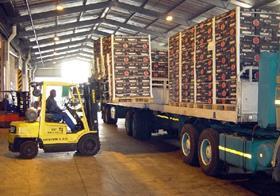
Fikile April Mbalula is perhaps the most travelled of all South African cabinet ministers. That is why many in the country are now scratching their heads to try and understand why he turned up in the transport sector of the new cabinet yesterday.
“It is a case of playing hop scotch and landing on his backside in the mess which is the Durban port,” said one industry leader. “One wonders if he has ever been in a port.”
It is clear that the minister has a difficult time ahead of him. As he prepares to be sworn in, a port strike is threatening the export industry. This comes on top of reports that productivity levels in the port of Durban, where the biggest proportion of the country’s citrus is shipped from, has dropped to even lower levels than last year.
Whether the colourful, sometime notorious new minister will be able to address this, we have to wait and see.
As a South African politician who is the former minister of police and minister of sports and recreation, a member of the national executive committee of the African National Congress and former leader of the African National Congress Youth League, he has travelled. The last year he managed the ANC’s election campaign after leaving in the cabinet under something of a cloud and even there he seems not to have managed that well, because his party’s share of the vote dropped to well below 60 per cent for the first time.
The strike at the ports was announced by the SA Transport and Allied Workers Union (Satawu) and started this morning. The union warned on Tuesday that it would embark on a total shutdown of the country’s ports over salary discrepancies at Transnet National Ports Authority (TNPA), where it claims whites earn more than their black colleagues.
The affected facilities include the port of Durban – one of the busiest ports in Africa – Richards Bay, Cape Town, East London, Port Elizabeth, Saldanha Bay and Mossel Bay.
It is not clear how this will affect export operations, but logistics service providers in Cape Town told Eurofruit that they were still able to deliver containers into stacks at the port for shipment this weekend.
The CGS’s Mitchell Brooke says in 2017 the CGA described the port operations in Durban as extremely poor and in 2018 it got worse.
“The early season performance at Durban port has been extremely disappointing,' said Brooke. 'The statistics show that Durban Container Terminal’s productivity is at an all-time low – the average ship Gross Crane Hours (GCH) is below 20 GCH (normally around 25 GCH) and the average truck turnaround time (TTT) is around 400 minutes, with some days exceeding a TTT of 600 minutes.”
He says things have got so out of hand that the truckers organised a protest on Wednesday (15/05) for 12 hours. This caused the biggest backlog of trucks ever seen. “The outlook for Durban operations, which is predominantly containerised, is not looking good at this early stage of the 2019 season.”
In some cases, the problems in Durban spill over to Port Elizabeth and Cape Town ports, when vessels have to skip these ports due to Durban delays.
Brooke saya the irony is that CMA CGM, who have been at the forefront of wanting to provide a service to the Middle East from Maputo, were set to withdraw on Monday due to lack of support. “Perhaps there should be a quick rethink in the industry before it’s too late.”



